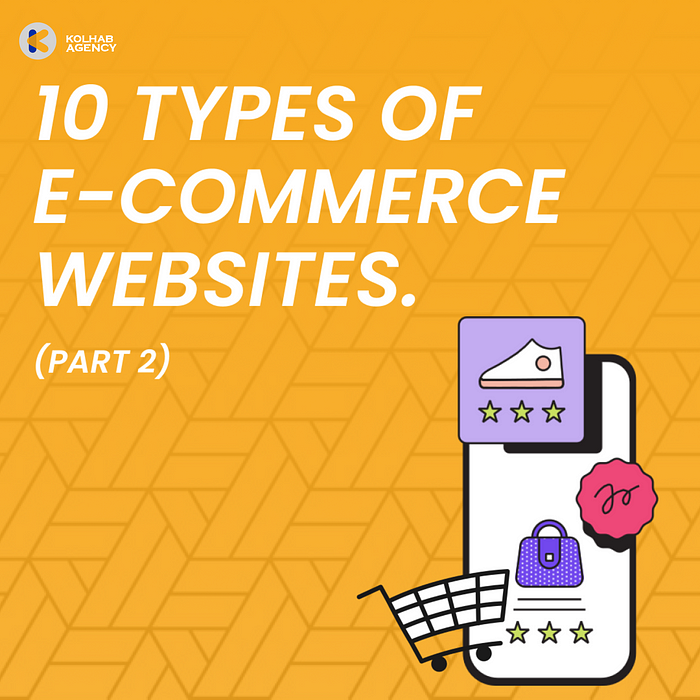10 Types Of E-commerce Websites ( Part 2 )

E-commerce refers to businesses and individuals who buy and sell goods and services over the Internet. E-commerce can be conducted on computers, tablets, smartphones, and other smart devices and operates in a variety of market segments. E-commerce transactions provide access to nearly every imaginable product and service, including books, music, plane tickets, and financial services such as stock investing and online banking. As such, it is regarded as a highly disruptive technology.
Online Store
If you sell products (or intend to sell them) and want your customers to be able to shop for them 24 hours a day, an online store is a website for you. An online store, similar to an online boutique or other retail stores, allows you to connect with customers and list inventory for sale.
To start an online store, you’ll need to set up payments and online business operations like order fulfilment, shipping, and sales tax, among other things. Your online store, like other websites, can be integrated with social media sites such as Instagram, Facebook, and Pinterest to help you reach more customers.
Portfolio
If you sell services, particularly creative services, you can use a portfolio to showcase your work and provide information on how interested parties can contact you. It should be one of your priorities when starting a business.
Portfolios are ideal for artists, writers, designers, photographers, and other professionals who want to show potential new clients examples of their best work.
Booking Website
With an online booking website, you can easily take customer appointments via digital channels. Offering a booking website or a “book now” button on your online store page can supplement or replace your in-person or phone appointment process. You can use a booking website to accept or decline appointments and block out personal time, keeping your availability up to date at all times.
A booking site is an excellent solution for salons, medical offices, and appointment-based consultants.
Lead Generation Site
If you want site visitors to take a specific action, such as signing up for a free trial, registering for a newsletter, or contacting you for more information, you should use a landing page.
Creating a landing page allows you to collect personal information from your site visitors, such as name, phone number, and email address, in the hopes of establishing contacts who could be potential leads or prospects for your business.
Media Website
A media website is a place to start a magazine, online news site, or other publication, or if you want to share collections of articles or videos. Consider the websites Forbes and The New York Times.
Using a media website, you can showcase and curate content for an online audience. Advertising, subscription memberships, or a combination of the two may support your media website. If you make money from memberships, you can restrict access to certain content to registered members only.
School Management System
The school management system directly connects schools and parents. It keeps parents updated on their children’s development and learning progress without waiting until the end of the semester or the occasional parent-teacher conference.
This information is available anytime, from the student’s performance to their ongoing projects. As a result, parents and teachers can collaborate to fulfil their responsibilities in teaching the youth.
How much time is required for student administration in one school if the administrative process takes a long time for just one student? Administrative tasks such as sending learning outcomes reports to parents can be completed with a few clicks using an integrated system. Teachers and school administration staff can use their valuable time to do other things at the same time.
Organization Membership Website
Many organizations devote significant administrative resources to recruiting new members and keeping track of existing ones. This frequently involves outdated and inefficient systems, with spreadsheets inherited from previous managers being a common theme. Sending out sign-up forms, processing payments, and updating member information can all be time-consuming tasks.
A well-planned website can automate much of this for you, saving time while reducing the possibility of human error and giving you control over information accuracy and member payments.
A successful association website will:
1. Have clear calls-to-action across the website to join
2. Include a simple sign-up form
3. Allow online payments for a variety of payment cards
4. Reduce administration for the association
The website can provide easy-to-access information about membership numbers and new sign-up rates to association management, breaking them down by membership type if necessary.
Larger associations will benefit from a website that connects directly to existing databases and systems, automatically creating new member profiles and issuing invoices
Conclusion
One of the primary benefits of having a website is that it is available to anyone, anywhere, at any time. Customers can access your website and avail your services or obtain the information they require even during non-business hours, which is one of the key elements of the importance of a website in business.